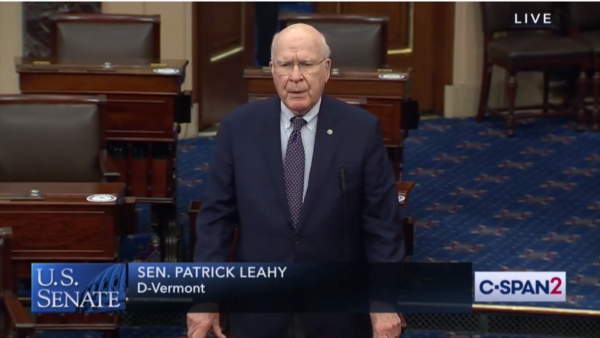
Vermont Democrat Senator Patrick Leahy, longest-serving member of the U.S. Senate, announced Monday he will not seek reelection in 2022, opening the gate wide for a scramble by potential successors.
Leahy, who earned a “C” rating from the National Rifle Association, told reporters he and his wife, Marcelle, decided “it is time to pass the torch to the next Vermonter who will carry on this work for our great state. It’s time to come home.”
According to the Associated Press, the transition “will be critical to Democrats who hope to maintain control of the Senate after next year’s midterm elections.”
Leahy was first elected in 1974, giving him eight 6-year terms, nearly a half-century on Capitol Hill during which he served three times as President pro tem.
Fox News noted that “Republicans are defending 20 of the 34 seats up for grabs in the 2022 midterms, they see pickup opportunities in the battleground states of Arizona, Georgia, Nevada, and New Hampshire.”
At age 81, Leahy said “I have reached the conclusion that it’s time to put down the gavel.”
On the other side of the aisle, Republican Sen. Chuck Grassley of Iowa is reportedly planning to seek an eighth term.
The AP story suggests possible candidates to include Democrat Congressman Peter Welch. Fox News added these names: Vermont Senate President pro tem Becca Balint, state Sen. Kesha Ram-Hinsdale, and Lt. Gov. Molly Gray.
The AP story also says it is “uncertain which Republican Party candidates might seek their party’s nomination.”
Leahy has been a powerful force in Democrat politics on Capitol Hill for decades. He currently chairs the Senate Appropriations Committee and is the senior-most member of both the Senate Judiciary and Agriculture committees, the AP noted.
Joe Biden won the state in 2020 by 35 points and Fox News recalled he won re-election in 2016 by 28 points, so he will leave big shoes to fill.
During his career, he voted to prohibit so-called “assault weapons” and “high capacity magazines.” He opposed concealed carry reciprocity, and the Protection of Lawful Commerce in Arms Act. In 1993, he voted against the Brady Handgun Act.